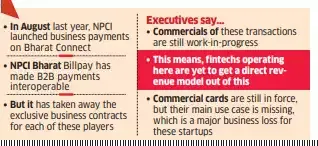Fintech startups like EnKash and PayMate, which were impacted by the regulatory ban on card-based business payments in February 2024, are using the Bharat Connect platform run by NPCI Bharat Billpay to get back into business.
“The RBI wants to bring multiple payment businesses onto a standardised network with proper redressal and settlement systems and Bharat Connect is doing the same with B2B payments, fintechs are becoming operating units on top of the platform,” said a senior banker in the know.
Platforms like EnKash, Happay, Open, Zoho and PayMate have become operating units which can power these transactions on the Bharat-Connect platform.
“Standardisation of Bharat Connect ensures that businesses, regardless of industry, can transact under a unified system with minimal friction,” said PayMate founder Ajay Adiseshann.
Yadvendra Tyagi, cofounder of EnKash, pointed out that the entire system has become regulated now and pay-outs can be linked to an invoice and mapped to GST filings.

In their previous avatar, these startups facilitated corporate entities to pay their vendors and other businesses via commercial cards issued by Visa and Mastercard. The Reserve Bank of India shut down the process last year, citing violation of the Payments and Settlement Systems Act.
This resulted in commercial spending on credit cards reducing drastically. Data from SBI Card, which is a listed credit card issuer, shows that corporate spending per card has gone down to around Rs 11,000 in December 2024 compared to Rs 51,000 a year back. These spends include corporate expenses and vendor payments.
In August last year, NPCI launched business payments on Bharat Connect and fintechs were offered to move their businesses to this platform.
Also Read: Fintech is making global payments its business
Challenges remain
NPCI Bharat Billpay has made B2B payments interoperable, but at the same time has taken away the exclusive business contracts for each of these players.
Additionally, with commercial credit cards still not being allowed, the upside for any business owner is limited.
“The current payment modes via bank accounts were anyway available with the companies. The question we are being asked is what is new that businesses get via Bharat Connect and what is their commercial benefit,” said a founder operating in this space.
Another senior industry executive said the commercials of these transactions are still work-in-progress, which means the fintechs operating here are yet to get a direct revenue model out of this.
Additionally, the commercial cards are still in force but their main use case is missing, which is a major business loss for these startups.
“The card-based payments are still held in abeyance by the RBI, so the cards are in force but the transactions have stopped; a large part of that business has been impacted,” said the second executive quoted above.
Formalisation of the space
While fintech founders rued the regulatory disruption they have faced, standardisation in these products has brought stability to their ventures.
“As operating units, we are regulated ventures now and investors are finding comfort in the fact that there are regulations in this space,” said Tyagi of EnKash.
Fintech investors are evaluating startups from the lens of how the RBI is looking at the space, and are taking their bets accordingly.
Overall, this also brings ease of customer onboarding, one of the major cost areas for fintechs.
“One of the key benefits of the platform is the reduction of redundant tasks, such as repetitive KYC collection and customer identification, which currently demand substantial time and resources,” Adiseshann said.
Also Read: Credit cards dominate bill payments on Bharat Connect
Delhi Elections Live
Tax calculator
Platforms like EnKash, Happay, Open, Zoho and PayMate have become operating units which can power these transactions on the Bharat-Connect platform.
“Standardisation of Bharat Connect ensures that businesses, regardless of industry, can transact under a unified system with minimal friction,” said PayMate founder Ajay Adiseshann.
Yadvendra Tyagi, cofounder of EnKash, pointed out that the entire system has become regulated now and pay-outs can be linked to an invoice and mapped to GST filings.

In their previous avatar, these startups facilitated corporate entities to pay their vendors and other businesses via commercial cards issued by Visa and Mastercard. The Reserve Bank of India shut down the process last year, citing violation of the Payments and Settlement Systems Act.
This resulted in commercial spending on credit cards reducing drastically. Data from SBI Card, which is a listed credit card issuer, shows that corporate spending per card has gone down to around Rs 11,000 in December 2024 compared to Rs 51,000 a year back. These spends include corporate expenses and vendor payments.
In August last year, NPCI launched business payments on Bharat Connect and fintechs were offered to move their businesses to this platform.
Also Read: Fintech is making global payments its business
Challenges remain
NPCI Bharat Billpay has made B2B payments interoperable, but at the same time has taken away the exclusive business contracts for each of these players.
Additionally, with commercial credit cards still not being allowed, the upside for any business owner is limited.
“The current payment modes via bank accounts were anyway available with the companies. The question we are being asked is what is new that businesses get via Bharat Connect and what is their commercial benefit,” said a founder operating in this space.
Another senior industry executive said the commercials of these transactions are still work-in-progress, which means the fintechs operating here are yet to get a direct revenue model out of this.
Additionally, the commercial cards are still in force but their main use case is missing, which is a major business loss for these startups.
“The card-based payments are still held in abeyance by the RBI, so the cards are in force but the transactions have stopped; a large part of that business has been impacted,” said the second executive quoted above.
Formalisation of the space
While fintech founders rued the regulatory disruption they have faced, standardisation in these products has brought stability to their ventures.
“As operating units, we are regulated ventures now and investors are finding comfort in the fact that there are regulations in this space,” said Tyagi of EnKash.
Fintech investors are evaluating startups from the lens of how the RBI is looking at the space, and are taking their bets accordingly.
Overall, this also brings ease of customer onboarding, one of the major cost areas for fintechs.
“One of the key benefits of the platform is the reduction of redundant tasks, such as repetitive KYC collection and customer identification, which currently demand substantial time and resources,” Adiseshann said.
Also Read: Credit cards dominate bill payments on Bharat Connect








